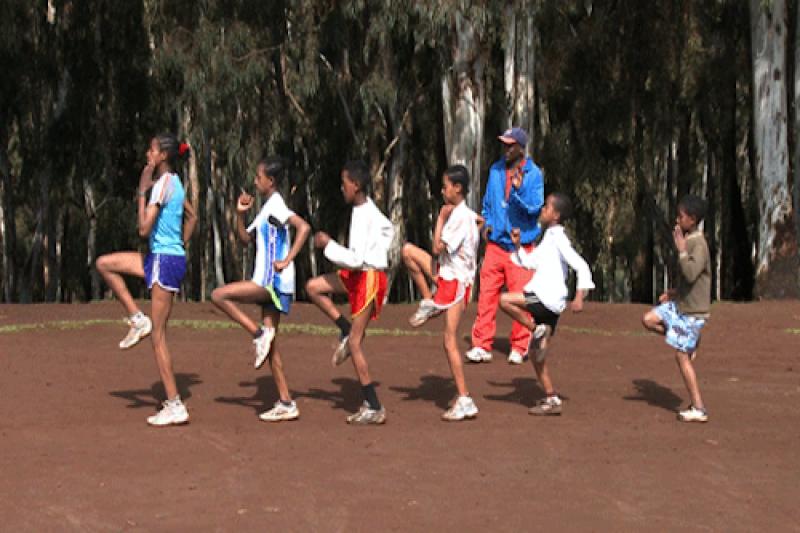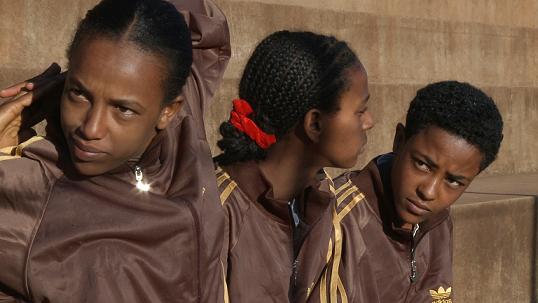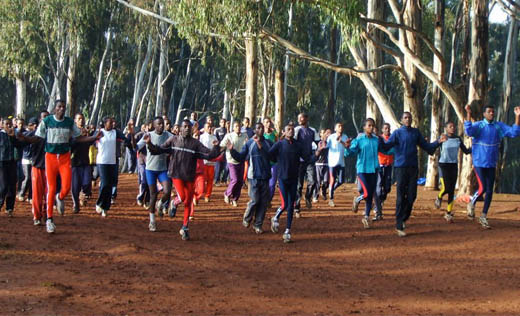Town of Runners | reviews, news & interviews
Town of Runners
Town of Runners
Two young Ethiopians from a small but remarkable town run for their lives

Footage of wiry East African men and women breaking the tape in marathons and distance track-events is now more or less synonymous with the highest achievements in top-level sport, and it won’t come as a surprise to those who’ve lived through more than a couple of cycles of the Olympic Games to be reminded that the medal-winners in the long-distance running events are no longer, generally speaking, from “round here”.
Even in the context of the Ethiopian highlands, the people of Bekoji – a town joined to Addis Ababa only by a dirt road – are like some kind of fitness cult. Or the inhabitants of Asterix’s village. It’s honestly as though there’s something in the water. Presumably not (though I reckon the idea merits further study) – but what there is, instead, is coach Sentayehu Eshetu, a local hero figure who in this country would long since have been given his OBE and who is responsible for having weaned the talents of such long-distance legends as Tirunesh Dibaba, Kenenisa Bekele and Derartu Tulu. Under Eshetu’s tutelage, in fact, at the Beijing Olympics alone, the town of Bekoji took gold in all four major distance events – more medals than most entire countries.
The young Alemi just chose to run everywhere. I’m sure I remember a similar story about Sebastian Coe
Town of Runners follows the trajectories of two girls, Hawii Megersa and Alemi Tsegaye, both aged around 15-16 (they don’t actually know), from what might be called the “start” of their running careers if the population as a whole didn’t seem to be out running from the age of about 10.
And while Hawii and Alemi attend running school in the woods, doing high knees at dawn, in the mist (with a soundtrack of chirpy home-grown jazz to show just how cheerful the Ethiopian people are, even when they’re under the lash), the context of Ethiopian small-town daily life is provided by the wistful voiceover of Biruk Fikadu, local kiosk-owner and (of course) aspiring runner who, we are led to assume from his downbeat demeanour, isn’t about to cruise to victory in the Olympic 5000m final.
 In fact, Biruk has already been stood done, even at a local level, on account of his youth and limited strength. So he tells of the Chinese trucks that are building the new road to the capital, of how the rains have come too late this year for the harvest to be saved, of how he hopes to pass his 10th grade matriculation at school and go on to qualify as a doctor.
In fact, Biruk has already been stood done, even at a local level, on account of his youth and limited strength. So he tells of the Chinese trucks that are building the new road to the capital, of how the rains have come too late this year for the harvest to be saved, of how he hopes to pass his 10th grade matriculation at school and go on to qualify as a doctor.
Bekoji is the standard grim environment for an African documentary. Literally dirt poor, a town of tough subsistence farming. The local beauty salon is two combs and a seat in someone’s front garden. In the market, they weigh out garlic bulbs and Chinese Wellingtons (Eshetu refers to “the Chinese” as “a road construction company”: amusing, and at a local level in much of Africa, basically true). At the Oromia regional championships, the running track is laid out by hand, with white chalk and plumb line, on a surface of raked earth. And after the rainy season in Bekoji, the runners’ first job is to hoe the training ground back into existence. Even at the national championship level, most of the competitors are running in bare feet.
And so it becomes clear that running, for those who take it seriously, quickly goes from being the clichéd “way of life” of die-hards everywhere to actually being “life” in toto. And this is where the film begins to turn.
Running is seen as a way to achieve national honour, do right by your parents, and so on and so on; but it is also seen as a living – an escape, in a totally un-metaphorical sense. “There is nothing else,” says Hawii’s mother, “but education and running.” And if Hawii should fail at both of those? Mrs Megersa laughs: “Marriage.” Alemi’s mother has never even seen her daughter run: she is too busy farming. She didn’t set out to produce an athlete either: the young Alemi just chose to run everywhere, “like a madwoman!” I’m sure I remember a similar story being narrated once about – and by? – Sebastian Coe.
 The idea is that Hawii and Alemi (and the many thousands of other hopefuls) will progress through the various stages of regional and national athletics until they are a) chosen – and salaried – by a club, and b) selected to run for their country. And here the unpleasantness sets in. Hawii is gypped of her place in a regional final because the team wants an older, stronger girl to compete. Officials deny that she was even in a race in which she finished fifth – and have to be bullied into watching a handheld video of the heat before they admit they made a mistake. Alemi loses out on a place at a new school because some low-level pen-pusher has misspelled her father’s name on a form.
The idea is that Hawii and Alemi (and the many thousands of other hopefuls) will progress through the various stages of regional and national athletics until they are a) chosen – and salaried – by a club, and b) selected to run for their country. And here the unpleasantness sets in. Hawii is gypped of her place in a regional final because the team wants an older, stronger girl to compete. Officials deny that she was even in a race in which she finished fifth – and have to be bullied into watching a handheld video of the heat before they admit they made a mistake. Alemi loses out on a place at a new school because some low-level pen-pusher has misspelled her father’s name on a form.
With great fanfare, the Oromia government opens 18 new running academies, with Adidas outfits in every colour of the rainbow (well, three-stripe, anyway: Adidas do sponsor the Ethiopian national kit, but I doubt they make 10 percent of what’s sold in Ethiopian markets): a year later, the accommodation blocks are still not finished (the athletes, of course, are nonetheless living in them), and the runners are being told that the budget no longer runs to meals. Cut to footage of suited athletics officials crowding the buffet at a back-slapping event in the capital. Soon enough, the athletes in one regional training academy are forced to strike in order to persuade the state to transport them to the very competitions for which they have ostensibly been training.
Some runners flourish (despite the system), but others wither. And slowly but surely, the otherwise upbeat Town of Runners comes around to confronting the reality that, as with so many dreams, for those who aren’t going to make it as a doctor, a shop-keeper or a farmer, running also begins to look to a very faint hope indeed.
- Town of Runners opens in cinemas tomorrow. For listings, and to book tickets for Q&A sessions with Jerry Rothwell and Sentayehu Eshetu, click here.
Watch the Town of Runners trailer
The future of Arts Journalism
You can stop theartsdesk.com closing!
We urgently need financing to survive. Our fundraising drive has thus far raised £49,000 but we need to reach £100,000 or we will be forced to close. Please contribute here: https://gofund.me/c3f6033d
And if you can forward this information to anyone who might assist, we’d be grateful.

Subscribe to theartsdesk.com
Thank you for continuing to read our work on theartsdesk.com. For unlimited access to every article in its entirety, including our archive of more than 15,000 pieces, we're asking for £5 per month or £40 per year. We feel it's a very good deal, and hope you do too.
To take a subscription now simply click here.
And if you're looking for that extra gift for a friend or family member, why not treat them to a theartsdesk.com gift subscription?
more Film
 Blu-ray: Wendy and Lucy
Down-and-out in rural Oregon: Kelly Reichardt's third feature packs a huge punch
Blu-ray: Wendy and Lucy
Down-and-out in rural Oregon: Kelly Reichardt's third feature packs a huge punch
 The Mastermind review - another slim but nourishing slice of Americana from Kelly Reichardt
Josh O'Connor is perfect casting as a cocky middle-class American adrift in the 1970s
The Mastermind review - another slim but nourishing slice of Americana from Kelly Reichardt
Josh O'Connor is perfect casting as a cocky middle-class American adrift in the 1970s
 Springsteen: Deliver Me From Nowhere review - the story of the Boss who isn't boss of his own head
A brooding trip on the Bruce Springsteen highway of hard knocks
Springsteen: Deliver Me From Nowhere review - the story of the Boss who isn't boss of his own head
A brooding trip on the Bruce Springsteen highway of hard knocks
 The Perfect Neighbor, Netflix review - Florida found-footage documentary is a harrowing watch
Sundance winner chronicles a death that should have been prevented
The Perfect Neighbor, Netflix review - Florida found-footage documentary is a harrowing watch
Sundance winner chronicles a death that should have been prevented
 Blu-ray: Le Quai des Brumes
Love twinkles in the gloom of Marcel Carné’s fogbound French poetic realist classic
Blu-ray: Le Quai des Brumes
Love twinkles in the gloom of Marcel Carné’s fogbound French poetic realist classic
 Frankenstein review - the Prometheus of the charnel house
Guillermo del Toro is fitfully inspired, but often lost in long-held ambitions
Frankenstein review - the Prometheus of the charnel house
Guillermo del Toro is fitfully inspired, but often lost in long-held ambitions
 London Film Festival 2025 - a Korean masterclass in black comedy and a Camus classic effectively realised
New films from Park Chan-wook, Gianfranco Rosi, François Ozon, Ildikó Enyedi and more
London Film Festival 2025 - a Korean masterclass in black comedy and a Camus classic effectively realised
New films from Park Chan-wook, Gianfranco Rosi, François Ozon, Ildikó Enyedi and more
 After the Hunt review - muddled #MeToo provocation
Julia Roberts excels despite misfiring drama
After the Hunt review - muddled #MeToo provocation
Julia Roberts excels despite misfiring drama
 London Film Festival 2025 - Bradley Cooper channels John Bishop, the Boss goes to Nebraska, and a French pandemic
... not to mention Kristen Stewart's directing debut and a punchy prison drama
London Film Festival 2025 - Bradley Cooper channels John Bishop, the Boss goes to Nebraska, and a French pandemic
... not to mention Kristen Stewart's directing debut and a punchy prison drama
 Ballad of a Small Player review - Colin Farrell's all in as a gambler down on his luck
Conclave director Edward Berger swaps the Vatican for Asia's sin city
Ballad of a Small Player review - Colin Farrell's all in as a gambler down on his luck
Conclave director Edward Berger swaps the Vatican for Asia's sin city
 London Film Festival 2025 - from paranoia in Brazil and Iran, to light relief in New York and Tuscany
'Jay Kelly' disappoints, 'It Was Just an Accident' doesn't
London Film Festival 2025 - from paranoia in Brazil and Iran, to light relief in New York and Tuscany
'Jay Kelly' disappoints, 'It Was Just an Accident' doesn't
 Iron Ladies review - working-class heroines of the Miners' Strike
Documentary salutes the staunch women who fought Thatcher's pit closures
Iron Ladies review - working-class heroines of the Miners' Strike
Documentary salutes the staunch women who fought Thatcher's pit closures

Add comment